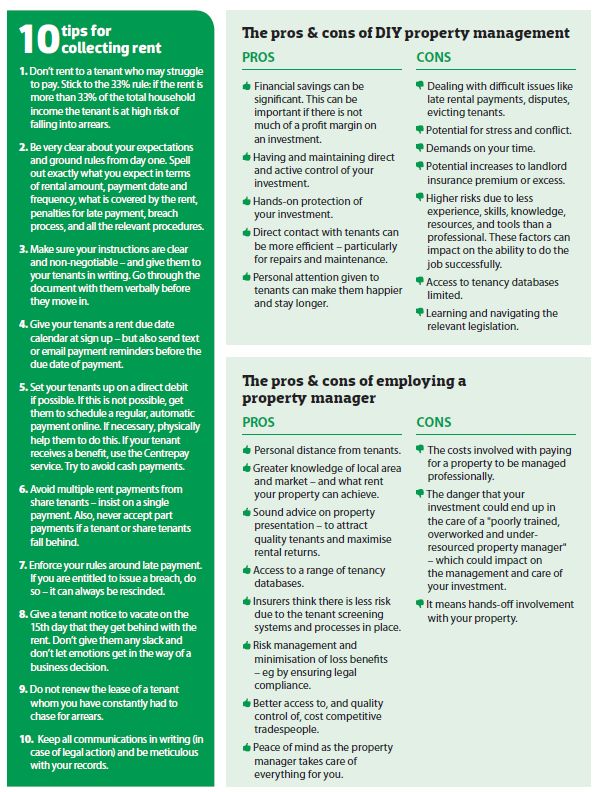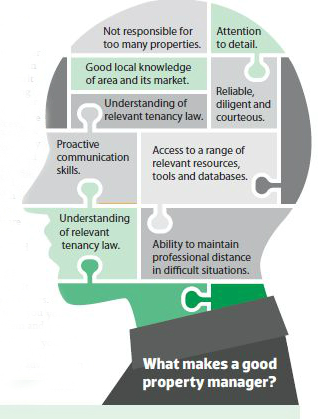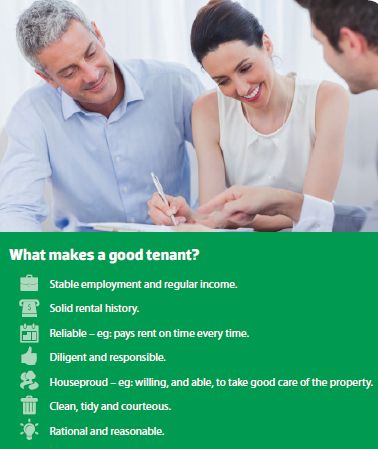Oh, what a feeling! The papers are signed, the keys are in your hand and you finally have possession of your new investment property... Those early days of property ownership are exhilarating.
However, once the sensation of heady triumph has settled, it is time to think about the practicalities of managing your investments effectively. To maximise your returns, you need good tenants, limited vacancy periods, a healthy rental income and a well maintained property.
In order to achieve this, you need a dedicated property manager. So, first up, you need to decide whether you wan to manage your property yourself or whether you wan to employ a property manager to do it for you.
Only you have made this decision can you address the broader range of issues and tasks involved with property management. To help out investors struggling with such a decision, here is Your Investment Property's guide to what you need to know and do when it comes to property management.
Making a management decision
Deciding on whether to DIY or to use property managers - although crucial - is not difficult. There are number of straightforward questions it is necessary to ask yourself. Your realistic assessment of these questions should determine your decision.
The sort of questions you need to ask yourself are:
- Is it physically possible to manage the property? This involves thinking about your vicinity to the property. For example, if the one you live in, DIT management could be difficult.
- Do I want to, and am I able to, dedicate the amount of time required to effectively manage the property? If not, DIY management is not likely to work.
- Can I access the resources and tools needed to advertise the property for rent, to screen tenants and to manage tenancy and maintenance issues? If not, DIY management will be an uphill battle.
- Do I have an understanding of residential tenancy law and the related processes and practices? While this is something that can be learned, any potential DIY-er has to be committed to doing so and, then, to ensuring then stay up-to-date with any changes.
- Will I save money? Cost savings are one of the attractive features of DIY property management. But those savings can drain away quickly if you don't know what you are doing.
- Can I remain objective in the face of tenancy disputes and other challenging situations, such as late rental payment? If not, DIY management will be a stressful experience.
"This means that for someone who can remain emotionally detached DIY management is fine. But, for a more socially-oriented person, it can be more difficult. You have to be able to deal with tenant problems and tough situations dispassionately."
Gilbert says that if a property owner has the right sort of personality for DIY property management they should give it a go. If only to get better understanding of, and experience in, managing a property. " If it doesn't work out, then you can always switch to a property manager. It isn't hard to switch if need be."
However, it is important to remember that DIY property management is not for everyone, he says. "If someone doesn't know what they are doing and doesn't have the time to learn, they should definitely opt for a property manager."
DIY property management
If you decide you want DIY the management of your property, or properties, there are cetain things that you need to take into account.
Eezirent managing director Diane Bukowski says that, much as with self-managed super funds, many people now think that if they have the right information and tools they can effectively manage their own investment property.
In her view, this assumption is correct. Technology and the increasing availability of relevant information and resources does enable people to manage their own properties succcessfully.
"It is crucial for DIY property managers to have access to the right resources, technology and information - along with advice and support. Especially when searching for, and then screening, tenants. Achieving this is necessary to minimise vacancy periods and downtimes.. It is this area that is the biggest stumbling block for DIYers."
Gilbert agrees, but adds it is also essential to have a strict rules and a guiding plan when it comes to things like enforcing lease agreements.
Not only do you need to know what sort of lease agreeements you should have, you have to be prepared to be forceful about the said rules in these agreements, he says. "Both you and your tenants need to know that you will follow through with the procedures you have put in place for, say, managing rental payments and dealing with late payments.”
Both Bukowski’s Eezirent and Gilbert’s Rent My Estate services provide advice, help and support for DIY property managers. They also provide access to the tools and resources necessary for tasks like advertising properties and signing up tenants.
- Advertising the property (for rent)
- Finding and vetting tenants
- Accepting applications – signing tenants to a lease, arranging the appropriate bond and deposit, lodging the bond with the appropriate bond authorities
- Collecting rental payments
- Responding to enquiries and requests – both before and after rental
- Conducting property inspections
- Keeping comprehensive records (including photos
- Conducting rental appraisals and setting rent increases
- Overseeing repairs and maintenance
- Understanding tenant rights, as well as landlord rights and responsibilities (which requires knowledge of the relevant tenancy legislation)

Employing a property manager
Deciding to use a property manager is a choice people often make after trying to manage their property themselves, says Property Boss managing director Tamara Schiess.
“People think they can handle the whole process, but start to find it difficult when a tenant falls behind on the rent or some sort of dispute arises. Not only is there a conflict, but they are not getting the rental income they planned for.”
"Most people find such situations stressful."
Having a property manager allows a landlord to maintain personal distance in difficult situations, while benefitting from their knowledge, experience and access to more advanced resources and tools.
Further, Schiess says quality property managers don’t need to be managed. A proactive property manager should be in regular contact with a landlord about their property to ensure they are aware of what is going on.

A key indicator of a good property manager is if they provide you with updates regularly, she continues. “It shows they are on top of things. If you are not getting that, you should check in with them and ask about the state of your property and whether there are any issues… But they should be proactively advising you on a regular basis.”
- How many properties do they have on their books? If they have too many it can impact on the quality of the service the property receives. The industry standard is about 120 properties per property manager.
- How many years have they been managing properties in the area? And how long have they worked for the agency they are with? Good local experience and a decent period of time with an agency indicate knowledge and stability.
- How actively involved is the agency principal in the running of the property management division? Active principal involvement indicates support for, and ongoing development of, the property management team.
- Will you be provided with one point of contact or will you be required to speak to different people depending on the issue? Neither approach is necessarily better, but one might suit you more as a landlord.
- What systems are in place to manage tasks like tenancy renewals, finding and vetting tenants, rent collection, dealing with tenancy disputes, and maintenance and repair issues? Also, in such situations, how will both you and the tenant be notified and in what timeframe?
- How do they determine the appropriate rent to be charged for the property? And what advice can they offer to maximise rent for the property, now and in the future?
- How will a property be advertised for rent? Are tenants shown through the property individually if they are not able to attend a scheduled showing?
- How are prospective tenants screened and selected? What systems are in place to check credit history, previous rental history, income and employment stability, and references?
- How often are inspections carried out? Who conducts them? What is the process? There should be a commitment to supplying you with relevant, dated photos postinspection.
- Are they happy to give you landlord testimonials and references from clients? And are they happy for you to contact their references to discuss their service? Property managers who are proud of their service are happy to do this – and will have clients who are happy to talk about their service.

- Require them to fill out a detailed application form.
- Get both professional and personal references and thoroughly verify them.
- Request at least three months bank statements.
- Use a credit referencing service.
- Get extra information – eg: a utility bill in the tenant's name.
- Ask them to show evidence of assets.
- Speak to their current real estate agency and, if possible, some previous landlords to establish their rental history.
- Call their current employer and, if possible, a past employer to establish their employment record.
- Ask for a copy of their passport and/or driver’s licence.
- Secure a guarantor – eg a parent.
- Check tenancy databases to see if they have been listed as a bad tenant.
- Always meet them in person to assess them and get a feel for who they are.
Finding good tenants
Whether or not you decide to employ a property manager, it is sensible to have an understanding of the processes involved in finding and selecting tenants. Even if you never have to carry out these tasks yourself, you should know how it should be done. This is to ensure you are getting the best tenants possible to maximise returns on your investment.
The key to finding a good tenants lies in:
1. Attracting quality prospective tenants to your property with effective advertising, marketing and property presentation.
2. Comprehensively and rigorously screening tenant applicants to identify the best, most reputable prospects.
While there are a set of crucial checks and vetting practices that need to be applied in this process, it is not a science. Both Bukowski and Gilbert emphasise the importance of getting to know applicants on a personal basis – and also “going with your gut instincts” about them.
Meanwhile, Schiess says that one of the traps people fall into is rushing into a decision too quickly. “But an
extra week or two of rent might pale in significance compared to a bad tenant decision made in a hurry. It is important to take the time to find the right fit in a tenant from the start."
Staying on top of maintenance
When it comes to the maintenance of your property there are two essential guiding rules which all landlords must stick to. These are:
1. Safety always comes first. Landlords are responsible for ensuring the safety of their property. It is crucial that nobody – be they tenants, neighbours, or the public – suffer injury or damage due to neglect of repairs or maintenance.
2. Attend to repairs and maintenance issues as quickly as possible. Do not let any such issues sit idle. Even a minor problem can quickly become an expensive one.

This feature is from the September issue of Your Investment Property Magazine. Download the issue to read more.

